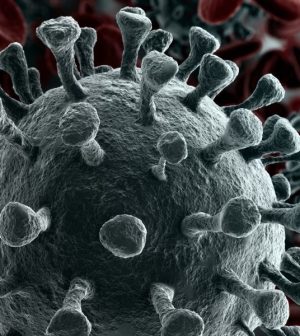- Recognizing the Signs of Hypothyroidism
- 10 Strategies to Overcome Insomnia
- Could Artificial Sweeteners Be Aging the Brain Faster?
- Techniques for Soothing Your Nervous System
- Does the Water in Your House Smell Funny? Here’s Why
- Can a Daily Dose of Apple Cider Vinegar Actually Aid Weight Loss?
- 6 Health Beverages That Can Actually Spike Your Blood Sugar
- Treatment Options for Social Anxiety Disorder
- Understanding the Connection Between Anxiety and Depression
- How Daily Prunes Can Influence Cholesterol and Inflammation
New Variants Mean COVID Vaccines, Tests May Need Tweaking: FDA

The emergence of new SARS-CoV-2 variants could require a quick pivot on the part of pharmaceutical and medical device companies, to help stay one step ahead of COVID-19.
The U.S. Food and Drug Administration issued guidelines Monday encouraging drug and test developers to pay attention to new coronavirus variants and be prepared to make that pivot if necessary.
The guidance provides recommendations for companies seeking to tweak already-approved vaccines, medicines and tests so that they will remain effective against any new variants that emerge.
“Many of these products might be impacted by changes to the virus, particularly their efficacy or their performance,” acting FDA Commissioner Dr. Janet Woodcock said during a media briefing Monday.
“We recognize we are in a pandemic situation and we need to make sure that health care providers have the best available diagnostics, therapeutics and vaccines to fight the virus. These may need to be modified over time to remain maximally effective,” Woodcock added.
The emergence of highly infectious new SARS-CoV-2 variants out of the United Kingdom, South Africa and Brazil have raised concerns that mutations might weaken the effectiveness of vaccines and drugs now used to treat the disease.
Studies have shown that the two vaccines now on the market remain effective in thwarting the U.K. and South African variants of the virus that causes COVID-19, but experts are worried that monoclonal antibody treatments might not work as well.
“Monoclonal antibodies are laboratory-made proteins that mimic the immune system in fighting off harmful pathogens such as viruses,” Woodcock said. “We know that some of the monoclonal antibodies that are currently authorized are less active against some of the SARS-CoV-2 variants that have emerged and are prevalent in some parts of the world.”
There are similar concerns about the effectiveness of COVID-19 tests to detect the new variants. The FDA has already issued a safety alert to caution that the presence of viral genetic mutations in a patient sample can potentially change the performance of a diagnostic test.
“The FDA has identified a few tests that are known to be impacted by emerging viral mutations, although at this time the impact does not appear to be significant,” Woodcock said.
The agency also issued guidance to help pharmaceutical companies prepare for tweaks to vaccines if a new variant emerges that flouts the antibody protection provided by the Pfizer and Moderna vaccines.
Companies should be prepared to test either reworked vaccines or new booster shots that would protect against emerging variants, after smaller-scale clinical trials that would involve a few hundred people and last two or three months, Dr. Peter Marks, director of the FDA’s Center for Biologics Evaluation and Research, said during Monday’s briefing.
“We think it’s prudent to start doing clinical trials,” Marks said, later adding, “We are encouraging people to start them sooner rather than later, without necessarily triggering production yet.”
More information
The U.S. Centers for Disease Control and Prevention has more on coronavirus variants.
SOURCES: Feb. 22, 2021, media briefing with: U.S. Food and Drug Administration Commissioner Janet Woodcock, MD; Peter Marks, MD, PhD, director, FDA’s Center for Biologics Evaluation and Research
Source: HealthDay
Copyright © 2026 HealthDay. All rights reserved.










